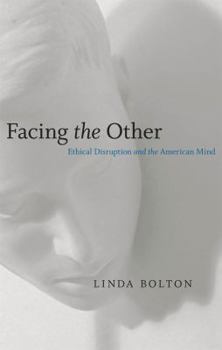Facing the Other: Ethical Disruption and the American Mind (Horizons in Theory and American Culture)
(Part of the Horizons in Theory and American Culture Series)
Select Format
Select Condition 
Book Overview
Linda Bolton uses six extraordinarily resonant moments in eighteenth- and nineteenth-century American history to highlight the ethical challenge that the treatment of Native and African persons presented to the new republic's ideal of freedom. Most daringly, she examines the efficacy of the Declaration of Independence as a revolutionary text and explores the provocative question What happens when freedom eclipses justice, when freedom breeds injustice? Guided by the intellectual influence of philosopher Emmanuel Levinas, Bolton asserts that the traditional subject-centered - or I - concept of freedom is dependent on the transcendent presence of the Other, and thus freedom becomes a privilege subordinate to justice. There can be no authentic freedom as long as others, whether Native or African, are reduced from full human beings to concepts and thus properties of control and power. American Farmer, Thomas Paine's incendiary political treatises, and Thomas Jefferson's Declaration of Independence in tracing the celebrations of the a priori right to freedom at America's founding. She then explores three critiques of the ideal of freedom insofar as it allows the persecution of others: Frederick Douglass's oratories, Native American Sarah Winnemucca's stage performances as an Indian princess, and radical abolitionist John Brown's violent raid on Harpers Ferry. Bolton shows that it is the face of the other that interrupts the American discourse on freedom to reveal freedom's limits and its obligation to justice. An eloquent and thoughtful re-reading of the U.S. touchstones of democracy, this book argues forcefully for an ethical understanding of American literary history.
Format:Hardcover
Language:English
ISBN:0807129402
ISBN13:9780807129401
Release Date:January 2004
Publisher:Louisiana State Univ Pr
Length:256 Pages
Weight:1.10 lbs.
Dimensions:9.0" x 1.0" x 6.0"
Customer Reviews
0 rating





